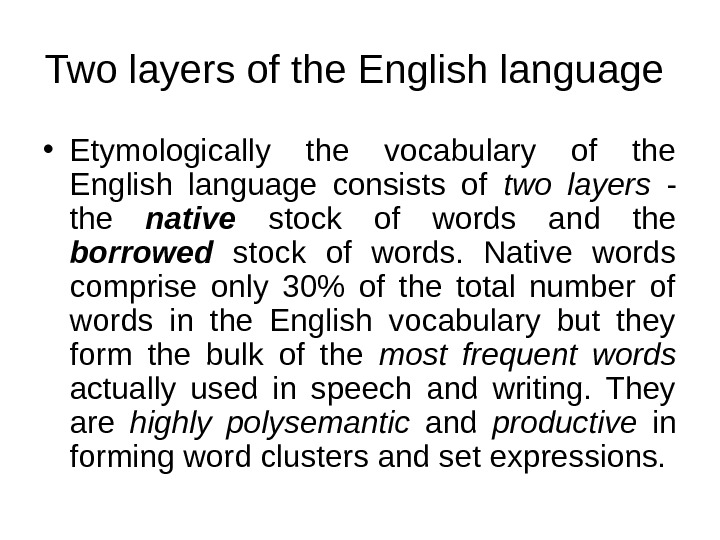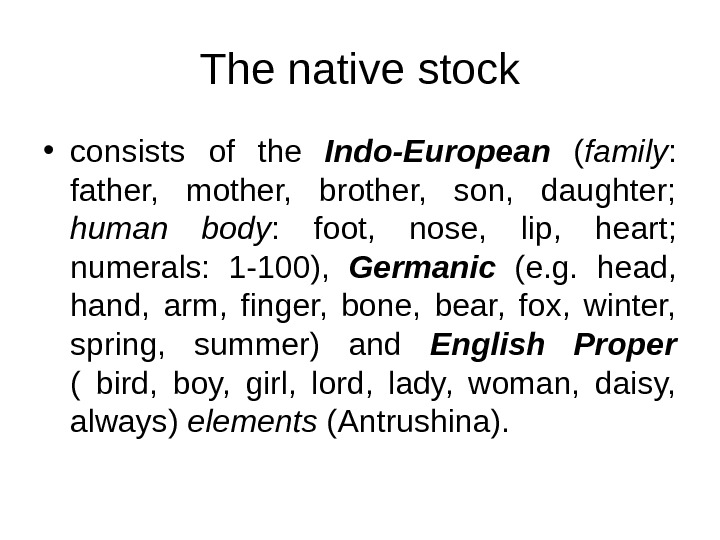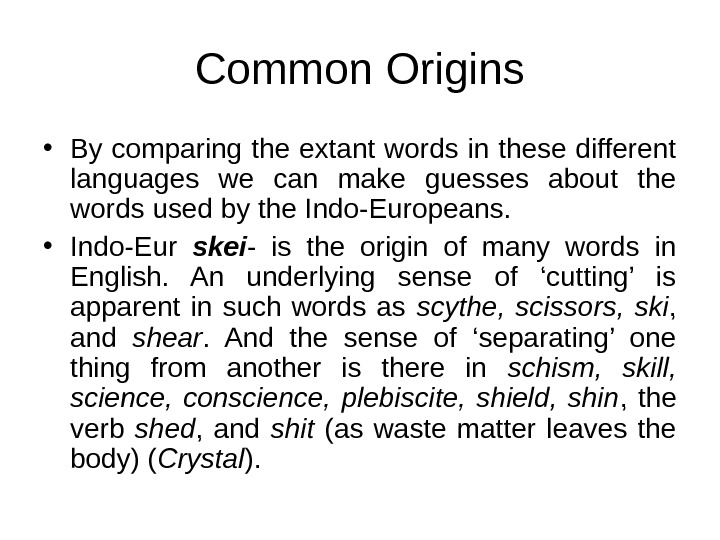English Lexicology. Part 1. Word-Building Lecture 3.

















- Размер: 75 Кб
- Количество слайдов: 17
Описание презентации English Lexicology. Part 1. Word-Building Lecture 3. по слайдам
 English Lexicology. Part 1. Word-Building Lecture 3. The Etymology of English Words. Native vs Borrowed Words. Dr T. N. Bogrdanova. Elista,
English Lexicology. Part 1. Word-Building Lecture 3. The Etymology of English Words. Native vs Borrowed Words. Dr T. N. Bogrdanova. Elista,
 Two layers of the English language • Etymologically the vocabulary of the English language consists of two layers — the native stock of words and the borrowed stock of words. Native words comprise only 30% of the total number of words in the English vocabulary but they form the bulk of the most frequent words actually used in speech and writing. They are highly polysemantic and productive in forming word clusters and set expressions.
Two layers of the English language • Etymologically the vocabulary of the English language consists of two layers — the native stock of words and the borrowed stock of words. Native words comprise only 30% of the total number of words in the English vocabulary but they form the bulk of the most frequent words actually used in speech and writing. They are highly polysemantic and productive in forming word clusters and set expressions.
 The native stock • consists of the Indo-European ( family : father, mother, brother, son, daughter; human body : foot, nose, lip, heart; numerals: 1 -100), Germanic (e. g. head, hand, arm, finger, bone, bear, fox, winter, spring, summer) and English Proper ( bird, boy, girl, lord, lady, woman, daisy, always) elements (Antrushina).
The native stock • consists of the Indo-European ( family : father, mother, brother, son, daughter; human body : foot, nose, lip, heart; numerals: 1 -100), Germanic (e. g. head, hand, arm, finger, bone, bear, fox, winter, spring, summer) and English Proper ( bird, boy, girl, lord, lady, woman, daisy, always) elements (Antrushina).
 Indo-European • Scholars know that Latin was one of the languages which evolved from a prehistoric tongue now called Indo-European. The Indo-Europeans, it is thought, were a semi-nomadic population living in the steppe region to the north of the Black Sea in the 4 th millenium BCE. As they spread into Europe and north India, their speech evolved into many langauges, such as Sanskrit, Greek, and Latin ( Crystal ).
Indo-European • Scholars know that Latin was one of the languages which evolved from a prehistoric tongue now called Indo-European. The Indo-Europeans, it is thought, were a semi-nomadic population living in the steppe region to the north of the Black Sea in the 4 th millenium BCE. As they spread into Europe and north India, their speech evolved into many langauges, such as Sanskrit, Greek, and Latin ( Crystal ).
 Common Origins • By comparing the extant words in these different languages we can make guesses about the words used by the Indo-Europeans. • Indo-Eur skei — is the origin of many words in English. An underlying sense of ‘cutting’ is apparent in such words as scythe, scissors, ski , and shear. And the sense of ‘separating’ one thing from another is there in schism, skill, science, conscience, plebiscite, shield, shin , the verb shed , and shit (as waste matter leaves the body) ( Crystal ).
Common Origins • By comparing the extant words in these different languages we can make guesses about the words used by the Indo-Europeans. • Indo-Eur skei — is the origin of many words in English. An underlying sense of ‘cutting’ is apparent in such words as scythe, scissors, ski , and shear. And the sense of ‘separating’ one thing from another is there in schism, skill, science, conscience, plebiscite, shield, shin , the verb shed , and shit (as waste matter leaves the body) ( Crystal ).
 Anglo-Saxon character of English • Despite all the loan-words which have come into E, at its core the language retains its Anglo-Saxon character. If we look at the frequency of words, all the most commonly occurring are Anglo-Saxon. The top 100 words include only 2 words people and use which are not Germanic (the, be, of, and, a, in, to, have, it, to, etc)
Anglo-Saxon character of English • Despite all the loan-words which have come into E, at its core the language retains its Anglo-Saxon character. If we look at the frequency of words, all the most commonly occurring are Anglo-Saxon. The top 100 words include only 2 words people and use which are not Germanic (the, be, of, and, a, in, to, have, it, to, etc)
 French vs Germanic • From 1000 to 1009: useful, extent, employment, regard, apart, present, appeal, text, parliament, cause • The length of the Germanic words is their most noticeable feature: say, go, get, make, see, know, time, think, come, last, give, new, way, look, etc.
French vs Germanic • From 1000 to 1009: useful, extent, employment, regard, apart, present, appeal, text, parliament, cause • The length of the Germanic words is their most noticeable feature: say, go, get, make, see, know, time, think, come, last, give, new, way, look, etc.
 Borrowed words • Borrowed words or loanwords are words taken from another language and modified according to the patterns of the receiving language. In many cases a borrowed word especially one borrowed long ago is practically indistinguishable from a native word without a thorough etymological analysis.
Borrowed words • Borrowed words or loanwords are words taken from another language and modified according to the patterns of the receiving language. In many cases a borrowed word especially one borrowed long ago is practically indistinguishable from a native word without a thorough etymological analysis.
 Major Periods of Borrowing • The following list is a small sampling of the loanwords that came into English in different periods and from different languages. • Middle English Period (1100 -1500): ( Scandinavian) Most of these first appeared in the written language in Middle English; but many were no doubt borrowed earlier, during the period of the Danelaw (9 th-10 th centuries): anger, cake, call, clumsy, doze, egg, fellow, gear, get, give, hale, hit, husband, kick, kill, kilt, law, low, lump, root, sc ore, sc owl, sc rape, sk ill, sk in, sk irt, sk y, take, they, them, their, ugly, want, window, wing
Major Periods of Borrowing • The following list is a small sampling of the loanwords that came into English in different periods and from different languages. • Middle English Period (1100 -1500): ( Scandinavian) Most of these first appeared in the written language in Middle English; but many were no doubt borrowed earlier, during the period of the Danelaw (9 th-10 th centuries): anger, cake, call, clumsy, doze, egg, fellow, gear, get, give, hale, hit, husband, kick, kill, kilt, law, low, lump, root, sc ore, sc owl, sc rape, sk ill, sk in, sk irt, sk y, take, they, them, their, ugly, want, window, wing
 Middle English Period: French • Law and government —attorney, bailiff, chancellor, country, court, crime, government, jail, judge, jury, noble, parliament, prison, revenue, state, tax, verdict • Church —abbot, chaplain, chapter, clergy, friar, prayer, preach, priest, religion. • Nobility —baron, baroness; count, countess; duke, duchess; marquis, marquess; prince, princess; viscount, viscountess; noble, royal • Military —army, artillery, battle, captain, company, corporal • Cooking —beef, boil, broil, butcher, dine, fry, mutton, pork, poultry • Culture and luxury goods —art, bracelet, clarinet, dance, diamond, fashion
Middle English Period: French • Law and government —attorney, bailiff, chancellor, country, court, crime, government, jail, judge, jury, noble, parliament, prison, revenue, state, tax, verdict • Church —abbot, chaplain, chapter, clergy, friar, prayer, preach, priest, religion. • Nobility —baron, baroness; count, countess; duke, duchess; marquis, marquess; prince, princess; viscount, viscountess; noble, royal • Military —army, artillery, battle, captain, company, corporal • Cooking —beef, boil, broil, butcher, dine, fry, mutton, pork, poultry • Culture and luxury goods —art, bracelet, clarinet, dance, diamond, fashion
 Early Modern English Period (1500 -1650) The effects of the renaissance begin to be seriously felt in England. We see the beginnings of a huge influx of Latin and Greek words, many of them learned words imported by scholars well versed in those languages. • Latin : abdomen, anatomy, area, capsule, compensate, dexterity, meditate, notorious, orbit, peninsula, physician, superintendent, ultimate, vindicate • http: //www. ruf. rice. edu/~kemmer/Words 04/structure/borrowed. html
Early Modern English Period (1500 -1650) The effects of the renaissance begin to be seriously felt in England. We see the beginnings of a huge influx of Latin and Greek words, many of them learned words imported by scholars well versed in those languages. • Latin : abdomen, anatomy, area, capsule, compensate, dexterity, meditate, notorious, orbit, peninsula, physician, superintendent, ultimate, vindicate • http: //www. ruf. rice. edu/~kemmer/Words 04/structure/borrowed. html
 Latin loans • are classified into the subgroups: • Early Latin loans. Those are the words which came into English language through the languages of the Anglo-Saxon tribes: (e. g. , cup, kitchen, mill, wine, port ). • Later Latin borrowings. These are the words which penetrated into English language in the sixth and seventh centuries, when the English people were converted to Christianity (e. g. , priest, bishop, nun, and candle ).
Latin loans • are classified into the subgroups: • Early Latin loans. Those are the words which came into English language through the languages of the Anglo-Saxon tribes: (e. g. , cup, kitchen, mill, wine, port ). • Later Latin borrowings. These are the words which penetrated into English language in the sixth and seventh centuries, when the English people were converted to Christianity (e. g. , priest, bishop, nun, and candle ).
 The third period of the Latin borrowings • includes words which came into English due to two historical events: the Norman Conquest and the Renaissance. Some came to English language through French but some were borrowed directly from Latin (e. g. , major, minor, intelligent, permanent ). • The latest layer of Latin words. The words of this period are mainly abstract and scientific words (e. g. , nylon, molecular, vaccine, phenomenon, and vacuum ). • http: //www. omniglot. com/language/articles/etymology. htm
The third period of the Latin borrowings • includes words which came into English due to two historical events: the Norman Conquest and the Renaissance. Some came to English language through French but some were borrowed directly from Latin (e. g. , major, minor, intelligent, permanent ). • The latest layer of Latin words. The words of this period are mainly abstract and scientific words (e. g. , nylon, molecular, vaccine, phenomenon, and vacuum ). • http: //www. omniglot. com/language/articles/etymology. htm
 English has grown in expressive richness • as a result of its many periods of lexical borrowing. It is now possible to make distinctions of meaning that would not have been possible before. Consider the triplet of adjectives: kingly (Germ), royal (Fr), and regal (Lat). Today we use them in all kinds of different ways. Kingly is for males only (before a noun); royal and regal apply to both sexes; royal can be used after nouns ( blood royal ) and royal blue , royal highness (technical and formal); regal look and regal confidence (behavior and appearance) ( Crystal ).
English has grown in expressive richness • as a result of its many periods of lexical borrowing. It is now possible to make distinctions of meaning that would not have been possible before. Consider the triplet of adjectives: kingly (Germ), royal (Fr), and regal (Lat). Today we use them in all kinds of different ways. Kingly is for males only (before a noun); royal and regal apply to both sexes; royal can be used after nouns ( blood royal ) and royal blue , royal highness (technical and formal); regal look and regal confidence (behavior and appearance) ( Crystal ).
 Doublets and triplets Germanic French Latin Ask Fast Fire Holy Rest Climb Weariness Clothes Sorrow Wish Question Firm Flame Sacred Remainder Attire Distress Desire Interrogate Secure Conflagration Consecrated Residue Ascend Lassitude
Doublets and triplets Germanic French Latin Ask Fast Fire Holy Rest Climb Weariness Clothes Sorrow Wish Question Firm Flame Sacred Remainder Attire Distress Desire Interrogate Secure Conflagration Consecrated Residue Ascend Lassitude
 stylistic range • To lose or avoid the alternatives shown in the panel above would be to rob the language of its stylistic range. There are huge differences of resonance between them. The short Old English words contrast with the long classical words. Informal speech and writing will tend to use the former, formal speech and writing the latter ( Crystal ).
stylistic range • To lose or avoid the alternatives shown in the panel above would be to rob the language of its stylistic range. There are huge differences of resonance between them. The short Old English words contrast with the long classical words. Informal speech and writing will tend to use the former, formal speech and writing the latter ( Crystal ).
 Домашнее задание 2 ( раздел 2. Этимология английской лексики); • 1) Повторить материал лекции; 2) прочитать главу по этимологии в учебниках: Антрушина Г. Б. Лексикология английского языка (с. 44 -71) и сделать практические задания (с. 71 -77); Арнольд И. В. Лексикология современного английского языка (с. 252 -261).
Домашнее задание 2 ( раздел 2. Этимология английской лексики); • 1) Повторить материал лекции; 2) прочитать главу по этимологии в учебниках: Антрушина Г. Б. Лексикология английского языка (с. 44 -71) и сделать практические задания (с. 71 -77); Арнольд И. В. Лексикология современного английского языка (с. 252 -261).
